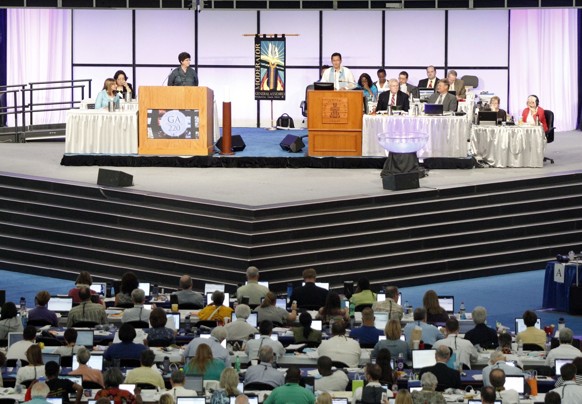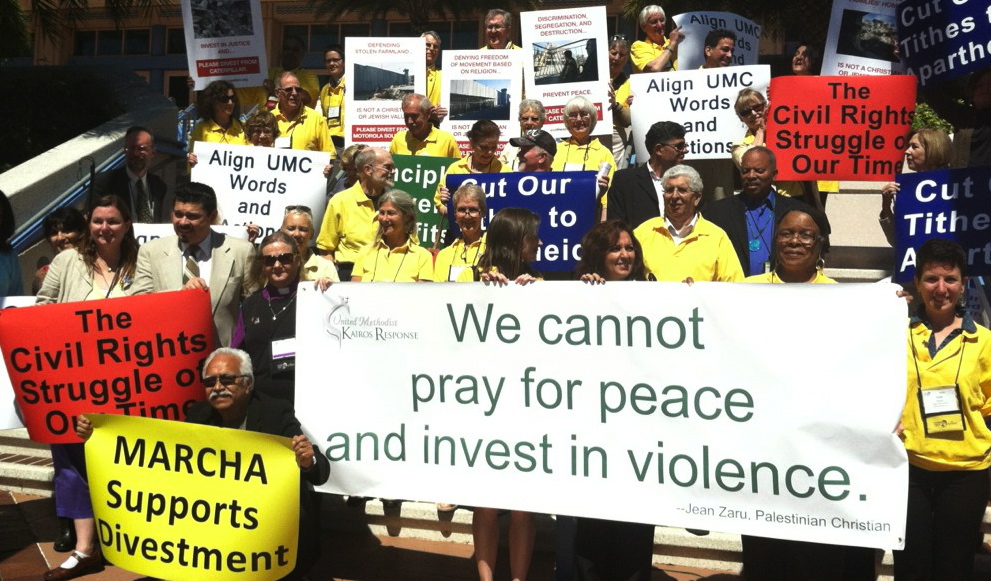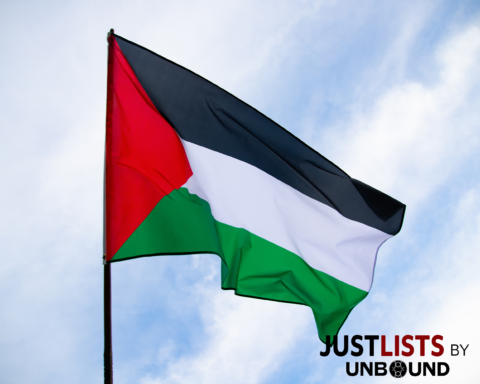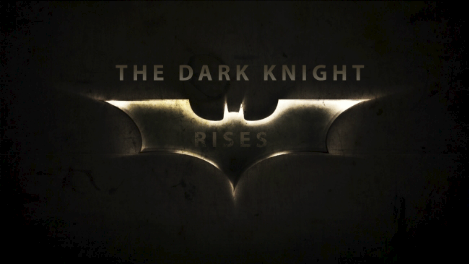Divestment & Boycott: A Question for Presbyterians, Methodists, Palestinians, and Christians the World Over
 Last week, the Presbyterian Church (U.S.A.) 220th General Assembly voted overwhelmingly (457-180) to boycott products produced in the occupied Palestinian territories. However, that same Assembly voted (by the slim margin of 333-331, with 2 abstentions) against considering divestment in companies supporting the occupation through non-peaceful activities, including the bulldozing of Palestinian homes. Instead, the Assembly chose to pursue positive investment in the Palestinian economy—despite the fact that Palestinians have repeatedly called for divestment, emphasizing that investment alone will accomplish little.
Communities around the world have hailed the decision to boycott as a significant moral and economic statement against the occupation. Many are deeply disappointed with the vote against divestment, though others believe the vote to be necessary for maintaining dialogue and the possibility of a two-state solution. Questions linger: Was this a victory or a loss? And for whom? Were Palestinian voices heard and answered? Did the Assembly understand and dialogue with the diverse, even differing, positions of the Jewish and Israeli community? What does this mean for the future of divestment strategy?
Was justice done?
It was not too long ago that the United Methodist Church faced similar questions, when its General Conference adopted an almost identical course of action, voting in favor of boycott but against divestment (replaced, again, with positive investment). As Presbyterians and Christians around the world grapple with these questions, the United Methodist Kairos Response offers a word of hope—and a plan for going forward.
One thing is for sure: we are not alone.
Last week, the Presbyterian Church (U.S.A.) 220th General Assembly voted overwhelmingly (457-180) to boycott products produced in the occupied Palestinian territories. However, that same Assembly voted (by the slim margin of 333-331, with 2 abstentions) against considering divestment in companies supporting the occupation through non-peaceful activities, including the bulldozing of Palestinian homes. Instead, the Assembly chose to pursue positive investment in the Palestinian economy—despite the fact that Palestinians have repeatedly called for divestment, emphasizing that investment alone will accomplish little.
Communities around the world have hailed the decision to boycott as a significant moral and economic statement against the occupation. Many are deeply disappointed with the vote against divestment, though others believe the vote to be necessary for maintaining dialogue and the possibility of a two-state solution. Questions linger: Was this a victory or a loss? And for whom? Were Palestinian voices heard and answered? Did the Assembly understand and dialogue with the diverse, even differing, positions of the Jewish and Israeli community? What does this mean for the future of divestment strategy?
Was justice done?
It was not too long ago that the United Methodist Church faced similar questions, when its General Conference adopted an almost identical course of action, voting in favor of boycott but against divestment (replaced, again, with positive investment). As Presbyterians and Christians around the world grapple with these questions, the United Methodist Kairos Response offers a word of hope—and a plan for going forward.
One thing is for sure: we are not alone.
United Methodist Kairos Response Energized by
General Conference
By the United Methodist Kairos Response
 A vibrant grassroots justice movement in the United Methodist church has been energized by the results of the denomination’s recent General Conference in Tampa. United Methodist Kairos Response (UMKR) is pleased that boycott and sanctions, two of the nonviolent moral steps requested by Palestinian Christians in the Kairos Palestine Document, were approved by the church’s 2012 General Conference in May. The mandate to call on all nations to boycott products produced in Israel’s illegal settlements is now part of official church policy. The conference also called for ending all U.S. military aid to the region.
A vibrant grassroots justice movement in the United Methodist church has been energized by the results of the denomination’s recent General Conference in Tampa. United Methodist Kairos Response (UMKR) is pleased that boycott and sanctions, two of the nonviolent moral steps requested by Palestinian Christians in the Kairos Palestine Document, were approved by the church’s 2012 General Conference in May. The mandate to call on all nations to boycott products produced in Israel’s illegal settlements is now part of official church policy. The conference also called for ending all U.S. military aid to the region.
In the coming months, United Methodists will be mobilizing to make sure they not only call on others to boycott, but engage in boycott as individuals and as churches. A list of products produced in the illegal settlements will be distributed to church members who may avoid them and put pressure on companies to stop selling them. In the process, United Methodists will learn more about the illegal settlements and their impact on Palestinian human rights, the environment, and the quest for peace in the Holy Land.
In 2009, almost 3,000 Palestinian Christians signed the Kairos Palestine Document, asking churches around the world for concrete action to end Israel’s 45-year occupation of their land.[i] Among the steps these Christians asked churches to take were boycott, divestment, and sanctions. UMKR was formed in response to that call.
UMKR’s educational campaign helped pave the way for the church’s endorsement of boycott and sanctions, and had urged selective divestment from companies that help sustain Israel’s occupation. It focused on three companies which have been engaged for years by the church and its ecumenical partners on this issue, without results. The Book of Discipline lists divestment as an option if corporate engagement fails to produce measurable results. At least three annual conferences have already divested and UMKR continues to ask other annual conferences as well as the General Board of Pensions and Health Benefits to follow their lead.
Regrettably, as an alternative to selective divestment, United Methodist General Conference delegates chose to put the church’s money into the Palestinian economy, despite statements from key Palestinian business leaders that this is not what they need. The Christian Chairman of the Palestine Development and Investment Corporation and CEO of Coca Cola Palestine, told delegates: “It may shock you, but whenever there is a viable project identified in Palestine, we can raise the funds. We don’t need your financial help, your charity. What we need is to be able to operate freely. Divestment is the best, most immediate way that you can help us achieve that. We have been waiting for more than 40 years; we need action now.”
The United Nations recently announced that Israel destroyed 620 Palestinian structures in the occupied West Bank in 2011 alone.[ii] These structures included homes, businesses, roads, and water supplies that served whole communities. One hundred other projects remain under threat of demolition, including ones funded by donors such as the European Union in places like Susiya in the West Bank, where the entire village, including an EU funded solar panel project, is being threatened with demolition by Israeli authorities.
The developer of the Palestinian residential community of Rawabi is allowed to remain in his native Palestine only by renewing his tourist visa every three months with Israeli authorities, and was required to sign an agreement stating he would destroy the vital, long sought access road to the community if Israel’s government tells him to.[iii] Despite the risk of putting funds into an environment where destruction is commonplace, the Pension Board’s Wespath division approached the Rawabi development about doing just that. (Because funding is already being provided by the country of Qatar, the offer was declined.)
United Methodists should question the concept of investing in Palestine’s economy, while at the same time investing in companies that are helping to destroy that economy. Such a strategy contradicts common sense and the Board’s fiduciary duties. UMKR also questions the vote by the Pension Board to continue holding stock in Hewlett Packard, which has lost more than half its value since August 2010,[iv] and announced layoffs of 27,000 employees on May 23, 2012.[v]
The theme of General Conference 2012 was “Make Disciples of Jesus Christ to transform the world.” UMKR volunteers are seeking to be Disciples of Christ for the transformation of the world. They believe that consistency between the church’s words and actions is essential to this goal.
UMKR has developed an extensive network of United Methodists around the globe who are committed to a just and sustainable peace in the Holy Land. The group will continue to advocate for nonviolent moral action to end Israel’s occupation. New members are joining weekly, and support has been received from people of many faiths. The educational work of UMKR, which has already borne fruit in the passage of boycotts and sanctions, will continue until Israel’s brutal and illegal occupation of Palestinian lands comes to an end.
Notes
[i] “Kairos Palestine: A Moment of Truth”. See 2,797 Palestinian Christian signatures.
[ii] “EU Palestinian aid projects destroyed by Israel, says aid groups,” Agence France Presse, May 14, 2012.
[iii] “Bumpy road in bid for landmark new Palestinian city,” by Sara Hussein, AFP, Feb 25, 2012.
[iv] “Ahead of the Bell: Mass layoffs looming at HP,” by Boston Globe Staff, Boston Globe, May 23, 2012.
[v] “HP lays off 27,000 employees in restructuring move” by Megan Geuss – May 23 2012, 10:02 pm EDT.






Unbound Social